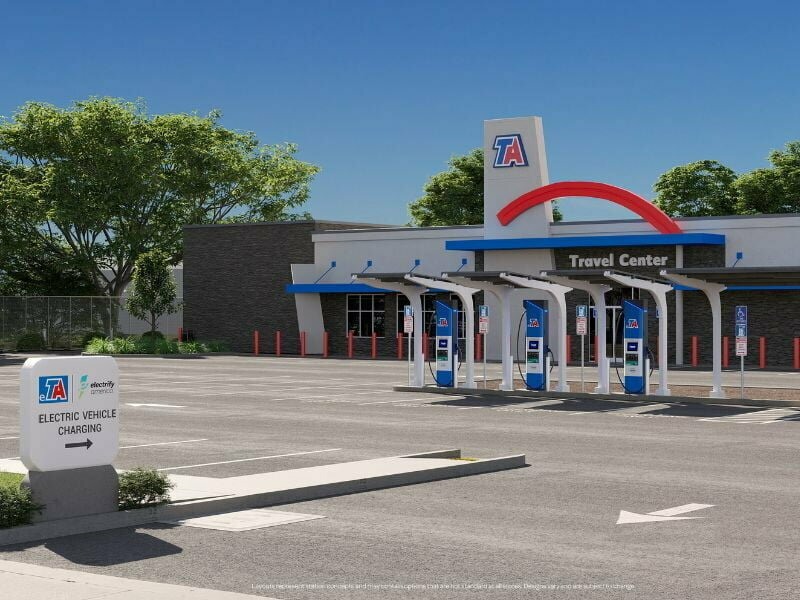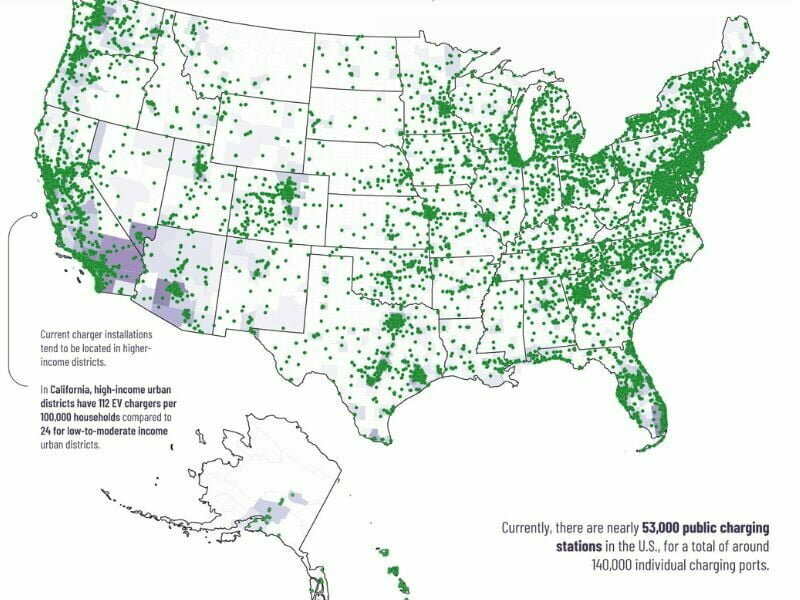 (Photo: TravelCenters of America enters agreement to install EV chargers. Courtesy of Electrify America.)
(Photo: TravelCenters of America enters agreement to install EV chargers. Courtesy of Electrify America.)Leaning into its heritage of serving long-distance drivers, TravelCenters of America (TA) is investing in Electrify America’s DC (direct current) fast chargers. By 2028, they plan to install approximately 1,000 individual EV chargers at 200 of their 284 locations, with a presence in 44 states.
It’s a win-win for the two companies. As consumer pressure builds for faster, more convenient EV charging stations, Electrify America (EA) needs more site hosts to fulfill its grand goal of 1,800 total charging stations with over 10,000 individual chargers by 2026. EA, as the largest open DC fast charging network in the U.S., will install and operate the charging stations for TA with its 8,800 contractor employees who service the chargers nationwide. TA, on the other hand, needs to keep up with the competition. Last year, Pilot Co. announced they would add fast-charging EV stations to 500 Pilot and Flying J locations by 2025.
TA brings in another major value add to EA’s network of chargers – rural spread. When you look at the World Economic Forum’s map of current EV charging locations, the majority of options clump around urban areas. This means many consumers view their EVs as only city cars, not as reliable options for road trips.
 (Credit: National Renewable Energy Lab, July 2022)
(Credit: National Renewable Energy Lab, July 2022)In fact, California alone possesses 29% of the EV charging stations in the U.S. with almost double the combined stations of the next three states, New York, Florida, and Texas. This is partly because of California and New York’s upcoming ban on the sale of gas cars by 2035. As other states begin to follow suit, it becomes paramount for car manufacturers to meet consumer worries about charging station convenience, now known as “range anxiety”. Research from the American Automobile Association (AAA) reported that 91% of electric vehicle owners say they had at least one concern prior to purchasing their car, with insufficient range and locating a place to charge is the most common.
TA however calls itself the nation's largest publicly traded full-service travel center network. Their locations are spread across the continental U.S., unlike EA’s other site hosts such as IKEAs, banks, and Walmart centers, TA hubs provide truck repair, restaurants, convenience stores, and overnight parking. In an experiment on EV charging reliability by Consumer Reports, it was noted that the vast majority of DC fast-charging places do not come with the same advantages as gas stations. There are no roofs to protect drivers from the weather, no windshield cleaning supplies, or convenient trash bins for roadside waste. Not to mention, by being on the Electrify America app, EV travelers can map their long-distance trips to connect with TA highway stops. This relief of range anxiety could help many customers finally make the switch to an EV car.
This sounds almost too good to be true, and it might be. EV charging customers have already complained on Twitter that EA needs to stop deploying new charging stations until they can address their reliability issues. An April 2022 study from the University of California, Berkeley noted that 19% of Electrify America’s EVSEs (electric vehicle service equipment) were non-functional when tested. This is still better than their competitors, ChargePoint (36.4%) and EVgo (25.5%), but if you are depending on a specific EV station on a long-distance drive, the risk is far too high. Tesla chargers were left out of the study, as they cannot be considered public and only work with Tesla vehicles. Yet a survey from the same group reported that only 4% of Tesla owners reported a major difficulty with their closed DCFC (direct current fast charge) system.
EA is still new to the scene, as it was not until June 2022 that it received its first external investor with a $450 million investment from Siemens. Established in 2016 as a subsidiary of Volkswagen Group of America, the automotive manufacturer started EA as part of its efforts to offset emissions.
This is no goodwill campaign either; the promise to launch a public EV charging network was part of a civil settlement after the U.S. EPA accused Volkswagen Group of hiding exceeded emissions from regulators with defeat devices. Also as part of this concession, Volkswagen pledged to promote brand-neutral zero emissions vehicles (ZEV) education and awareness campaigns, such as EA’s marketing campaign, “As Seen on EV”, to correct myths about driving range and charging station access.